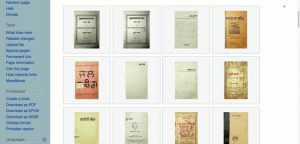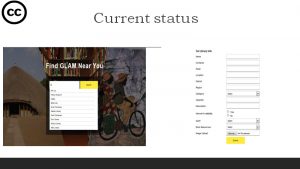There are too few nonprofit organizations like CC fighting for the commons – support our vital leadership with an end of year contribution. Donate today!
Meet the Winners of the CC Open GLAM Platform Activities Fund!
CommunityDuring the CC Global Summit, we had our “CC Open GLAM Platform Meeting”, where we had the opportunity to present several of the activities that we are running with the Open GLAM Platform Activities Fund. We’re delighted to announce the five winners of the General Projects of the Open GLAM Platform Activities Fund.
The CC Open GLAM Platform is a space to help coordinate efforts to aggregate, advertise, connect, and support open access to cultural heritage initiatives and projects. This year, CC launched an Activities Fund to support Open GLAM related activities by Platform members. In my role as Facilitator of the Platform, I presented a budget plan that received input and feedback from the community. We had three main allocations for the money:
- Open GLAM short stories from the Global South and/or underrepresented communities;
- General Projects;
- Visualization of the “Survey of GLAM Open Access policy & practice,” created by Douglas McCarthy and Dr. Andrea Wallace
You can read some of the Open GLAM short stories as they are being published on the Open GLAM Medium publication. We will be working with Majd Al-shihabi to create the visualization of the “Open GLAM survey”.
In this blog post, we present the five winning projects in the general category. We also warmly thank all applicants for the quality of their proposals, and to the members of the selection committee: Nicole Ferraiolo, Director of Global Strategic Initiatives, Council on Library and Information Resources; Jorge Gemetto, member of Creative Commons Uruguay and co-director of the online cultural center “Ártica”; Karin Glasemann, Digital Coordinator at the Nationalmuseum Sweden and Chair of the Copyright Community at Europeana; and Satdeep Gill, Program Officer, GLAM and Underrepresented Knowledge, Wikimedia Foundation.
- The AfroCine Project: Months of African Cinema
Sam Oyeyele is a long time volunteer of the Wikimedia community, where he has been involved with The AfroCine Project, a multi-country and multi-faceted project which aims to improve and expand digital knowledge and content on the historical and contemporary cinema, theatre, and arts sectors of several African countries, the Caribbean and the diaspora, on the Internet. The vision of this project is to bridge the huge content gap and improve on the systemic bias, in respect of the African continent, by getting real African stories and viewpoints into the mainstream. This is being achieved by making: articles, citations, images, videos, and data, about the historical and contemporary African cinema, theatre and arts, to be readily available and easily accessible on online, and in different languages, through Wikipedia and other sister projects. One of their main activities is the “Months of African Cinema” global Wikipedia contest, happening now between October-November. We’re supporting some of the expenses related to the organization of the “Months of African Cinema” contest.
- Heritage GLAM
Rupika Sharma is currently serving as Director of the non for profit organization Open Heritage Foundation. Open Heritage Foundation is an incorporated non-profit thematic organization to support initiatives for bringing underrepresented knowledge on the Internet, and they are an affiliated Network member of Creative Commons Global Network since 2019.
Their project will be working with a GLAM institution in India to digitize and release Punjabi public domain works on Wikimedia Commons.

Some of the works that the Punjabi community has uploaded and corrected in Wikisource through different contests.
Some of the works that the Punjabi community has uploaded and corrected in Wikisource through different contests.
If you are interested in knowing more about Rupika and the work the Open Heritage Foundation is doing in India, make sure to check her astonishing post “Lose yourself in Journey to Global Folklore with the winners of Wiki Loves Folklore,” about their Wiki Loves Folklore contest on the network publication Creative Commons: We like to share.
- Spreading GLAM-Wiki resources in Brazil
João Alexandre Peschanski is doing amazing work on the ground to help Brazilian GLAMs, together with Wiki Movimento Brazil. In their article “Opening up the collection of a closed museum in Brazil” on the Open GLAM Medium publication, funded with the Open GLAM short stories fund, they share with us their approach to opening collections in Brazil.
But they also received funding with their project “Spreading GLAM-Wiki resources in Brazil” will develop tutorials in Portuguese to ease the task of cultural institutions willing to share collections/contents on the internet but which lack a clear roadmap to do so. The need for these resources is key in the Brazilian context, as several institutions are under-resourced (they often have only one staff person) and cannot make an extra effort to bring collections/contents to the digital realm. This scenario is directly associated with the pervasive presence of collections/contents from wealthier countries.
You can see João’s recorded presentation of their project here:
- Online Ugandan GLAM Directory
Eric Nelson Haumba is the Public Lead of CC Uganda. In this opportunity, he is working to make an online directory of GLAM institutions in Uganda. This information will be freely available online through a GLAM directory where interested persons globally can check-in and access fundamental facts and information about Ugandan GLAM institutions. This directory is a representative source of basic GLAM statistics and a robust tool providing institutional-level data and a nationwide comparison of GLAMs in Uganda. This will allow the CC chapter and other communities to design different activities to help these GLAM institutions embrace open access to cultural heritage.

Screenshot of the current status of the online directory being designed by Eric Haumba.
- Enhancing Public Domain in Indonesia: Catalog and Re-Make Project
Hilman Fathoni and Fitriayu Penyalai are longtime members of CC Indonesia. Their project wants to show the value of the public domain in Indonesia. For that, they will be creating an open-access catalog of public domain works from Indonesia, and inviting a visual artist from Indonesia to create a remix using some of the public domain works currently available online. These activities will be presented in a webinar series, where the members of CC Indonesia will explain some of the core concepts of the public domain and how it works, the function of their open-access catalog, and invite the visual artist to talk about the remix of the public domain works resulting from this project.
We look forward to seeing project results soon, and we expect these projects to fuel more Open GLAM activities in 2021 and beyond.
Posted 17 November 2020